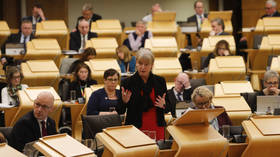Scotland lowers bar to transition gender

Residents of Scotland can now change their gender on official documents after just three months of living as their desired gender, with no psychiatric diagnosis of dysphoria required. The change comes as part of a controversial gender recognition package passed by the Scottish Parliament in an extended session on Thursday, six years after it was initially proposed.
Individuals previously had to live as their new gender for two years before applying for a gender recognition certificate, which is required to have the new gender legally recognized. The bill also extends the process to 16- and 17-year-olds, though they must live six months in their new identity before making it official. All applicants are afforded a three-month “reflection period” afterwards, in case they change their mind and want to revert to their original identity.
The law’s adoption followed an unprecedented two days of debate, with MPs considering no fewer than 150 amendments to assuage the concerns of colleagues who feared male predators might abuse the process to get close to their victims. One of the amendments that was inserted requires anyone convicted of a sexual offense to undergo a full risk assessment before such a person’s application for transition could be considered.
While the UK government warned the legislation would create “legal chaos” and spawn the phenomenon of “gender tourism,” Social Justice Minister Shona Robison defended the final version of the bill as “an important step to creating a more equal Scotland,” likening it to marriage equality and insisting that securing a gender recognition certificate would remain a “substantial and legal process.”
The bill passed with comfortable margins of support from the Scottish Greens, Labour, and Scottish Liberal Democrats, though the Scottish Conservatives were less than enthusiastic and reportedly attempted to filibuster the legislation so as to delay the vote until the new year. The party’s equalities spokesperson, Rachael Hamilton, accused the government of ignoring the will of the people and argued that “in the rush to make the process a little easier for trans people, the government is making it easier for criminal men to attack women.”













